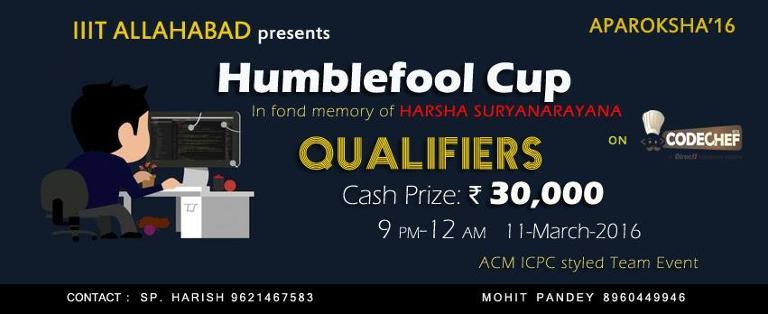
Hello everyone, We invite you all to Humblefool Cup 2016, an ACM-ICPC style team contest under Aparoksha 2016, annual Tech Fest of IIIT Allahabad. It is a two-tier contest.
First round is an online qualifier round which is on coming Friday. Duration of qualifier round is 3 hours. Qualifier round starts on 11th March, 2016 21:00 IST. Check you timezone here.
Top teams from qualifier round will be invited for Finals to be held in IIIT Allahabad.
Details of Qualifier Round
Link to contest: https://www.codechef.com/HFCQ2016
Register at: here
RSVP: Facebook Event Page
The problem-set is quite balanced and everyone will find something interesting to solve :)
Along with the fun of solving problems, there are prizes in cash amounting to INR 30000 to be won. Winning team will also receive the Humblefool Trophy.











Auto comment: topic has been updated by m17 (previous revision, new revision, compare).
Best of luck guys.
Is it the same as last year's CODESHOW ?
yes, it is.
Is this an ACM-style contest from all points of view? I'm interested in a single aspect: Only one of the members of a team can code at a moment? Or all of us cand code in the same time?
Ideally, only one of the members should code at a moment, but this can not be enforced in online qualifiers. However, during onsite finals, we'll provide only a single system to each team.
Thanks for answering. Also, I've just realised that what you are saying implies the fact that all the finalists are going to be in the same place?(I thought it is on-line too) In this case, are the travel expenses covered? Also, I seem to be unable to find where it says about the number of teams which are getting qualified
Yes, all the teams qualified for finals will compete at IIIT Allahabad during our Tech Fest. The travel expenses will not be covered. However, accommodation will be provided. The number of teams advancing for finals will be decided by the organizers later and those teams from leaderboard will be invited :)
What was the solution at problem E? We observed that the allowed moves actually form more cycles. And there were just 2 ways to bring the empty cell in the right place...it seems that it was wrong but I don't know why. Cand you please tell us the solution now(and not making us wait for the editorial)?
On observation, we can see that if we start with any cell and start moving to possible unvisited cells till now, we'll find a cycle. If N is even there will be 2 cycles of length (2 * N — 2) each and If N is odd, there will be only 1 cycle of length (4 * N — 4).
Now, if N is odd, Check if the sequence of Pandas in starting configuration is a cyclic rotation of the sequence of Pandas in final configuration (leaving empty cell in both).
If N is even, Check if empty cell occurs in the same cycle (1st or 2nd) in both starting and final configurations. If yes, check if other cycle of starting configuration is exactly same as other cycle of final configuration. If yes, check if the cycle containing empty cell of initial configuration is a cyclic rotation of the cycle containing empty cell of final configuration (leaving empty cell in both).
Shit! I forgot to check the other cycle to be the same...
I solved 5 problems (my team name is SolvingMachine), however in the standings my score is only 4. I submitted 30s before the end of the contest, so it seems is a bug in codechef :(
Yeah, looks like some bug in codechef. Don't worry, they'll resolve it soon :)
Ranklist is updated.
please put problems in the practice section.
Problems are updated in the practice section. You can submit questions by going to www.codechef.com/problems/problem_id
Problem Analysis
In your analysis, why is k = q1*q2*q3*q4*...*qy?
Why not (q1^a1)*(q2^a2)*(q3^a3)*... where q1, q2, q3,... are primes?
UPD: Oh, I get it now, I thought square free number is one whose square root is not integer. :/
How to solve Trip to Thailand. I thought like this:
Let k = (q1^a1)*(q2^a2)*(q3^a3)*...
Then P(k) = (a1+1)*(a2+1)*(a3+1)*...
Let n = (p1^b1)*(p2^b2)*(p3^b3)*...
n^P(k) = (p1^(b1*P(k)))*(p1^(b2*P(k)))*(p1^(b3*P(k)))...
Therefore, P(n^P(k)) = (b1*P(k) + 1)*(b2*P(k) + 1)*(b3*P(k) + 1)...
Is it wrong?
UPD: I understood what the problem was! Nice problemset!